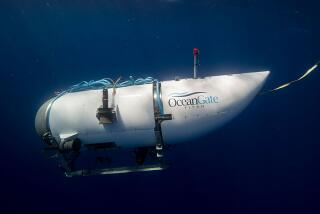He Cycles From Russia, She Hikes From Cape Town; Their Paths Cross in Morocco
- Share via
RABAT, Morocco — If a Russian cycles southwest 60 miles a day from St. Petersburg and a Scottish woman hikes north 31 miles a day from Cape Town where do they almost meet?
The answer is Morocco where Vladislav Ketov, who left St. Petersburg two years ago to cycle the world’s coastlines, has arrived at the same time as Ffyona Campbell, bidding to be the first woman to hike around the world.
Despite the odd coincidence of being in the same north African country at the same time, Ketov and Campbell are still worlds apart.
He is resting in Rabat and drawing portraits--in 10 minutes flat--to make some money while she is 750 miles south, hiking up from the Morocco-Mauritania border to Tangier.
“It would be absolutely marvelous if they could meet and trade transit tips,” said Campbell’s publicity contact, Patricia Boswell.
“Ffyona is being given a bash by the Moroccans in Marrakesh around Aug. 15. Perhaps the Russian could meet her there,” she added.
Campbell, 28, has already crossed the United States, Australia and Britain and plans to walk 14,375 miles.
She expects to reach the northern tip of the continent at Tangier by mid-September.
The blond, bearded Ketov, 44, left St. Petersburg two years ago with a budget of 200 rubles ($10) to cycle 125,000 miles along the world’s coastlines in 100 months.
He has pedaled around the coasts of Europe, the Middle East and North Africa to clock about 17,500 miles on his bike fitted with a shield to protect him from sun and rain.
“I hope to achieve a world record by cycling around the four continents along 125,000 miles of coastline,” he said. “I also want to draw the world’s attention to how important cycling is in protecting the environment.”
The Russian cyclist, who left his wife and two children behind in St. Petersburg when it was called Leningrad, is opposed to the pollution generated by motor-driven vehicles.
“My main aim is to demonstrate that with just two wheels, a human being can go around the world, saving energy and without harming nature or the environment. It is 10 times better than any other machine,” he said.
He plans to return home to St. Peterburg by the year 2000 after 100 countries in as many months.
Ketov said traveling through war zones has not been his biggest problem.
“I have more trouble with bureaucrats and complicated visa rules than with crossing war zones,” he said.
Ketov, who speaks only a few words of English apart from his Russian mother tongue, said that communication has been his only real problem so far, though it is not insurmountable.
“I discovered that at the end of the 20th Century, people on earth have only one common language--money,” he said with some bitterness. “Believe me, if you have money, there are no obstacles on your road.”
More to Read
Sign up for The Wild
We’ll help you find the best places to hike, bike and run, as well as the perfect silent spots for meditation and yoga.
You may occasionally receive promotional content from the Los Angeles Times.




